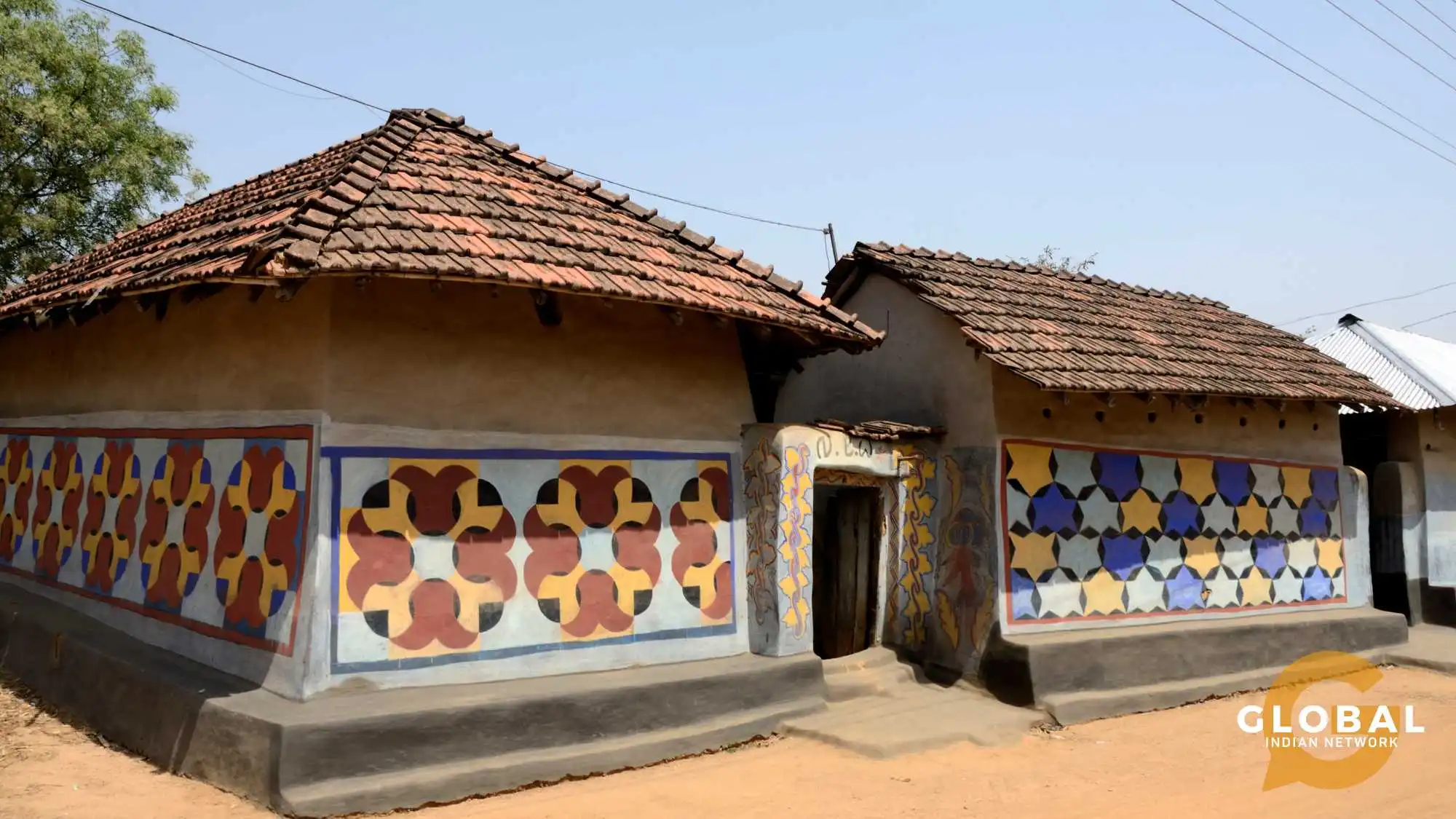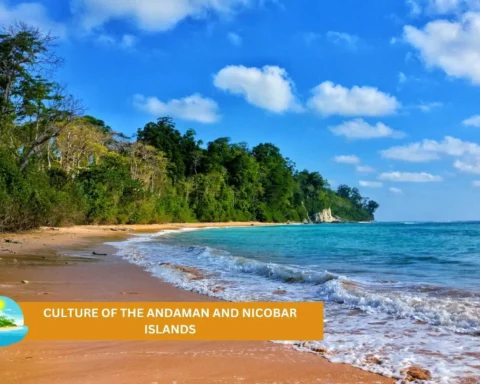Are tribal communities' rich heritage and deep connection to the natural world integral to India's social fabric?
That is not even a question, considering that democracy should entail inclusivity.
Despite constitutional protections and targeted government development programmes, these communities continue to face marginalization, poverty, and a lack of access to basic services.
This raises a pressing question: Is government intervention alone sufficient for developing tribal communities? Increasingly, evidence suggests that the role of NGOs in tribal development is not just important—it is indispensable.
This article explores the evolving role of NGOs in tribal development, especially where state mechanisms fall short.
Table of Contents
What is a Tribal Community?
A tribal community refers to indigenous communities, often called Adivasis, who share common ancestry, language, customs, and territory. Officially recognized as Scheduled Tribes (STs) under the Indian Constitution, these communities are identified for special protections and benefits. Defined in Article 366(25) and specified by the President under Article 342, tribal communities are characterized by unique cultural, social, and economic traits. They often reside in geographically isolated areas and maintain distinct traditions and lifestyles, making them a vital part of India’s cultural diversity and the focus of various welfare and development initiatives.
India has 1,108 recognized Scheduled Castes (16.6% - approximately 201 million people) across 28 states, and 744 recognized Scheduled Tribes (8.6% - approximately 104 million people) across 22 states.
Caste Census: From Margins to Metrics
While Scheduled Tribes are the primary focus, the socio-economic challenges faced by Scheduled Castes often mirror those of STs - poverty, exclusion, and limited access to opportunity. Their upliftment trajectories are deeply interlinked. The recent push for a caste census, once controversial when proposed by opposition parties, underscores this shared urgency.
Challenges Faced by Tribal Communities in India
As India plans to achieve overall progress, the role of NGOs in tribal development is significant. Tribal populations, often residing in remote and resource-rich regions, grapple with a unique set of challenges:
- Socioeconomic Marginalization: Limited access to education, healthcare, and employment keeps many tribal families trapped in cycles of poverty.
- Resource Depletion and Land Issues: Dependence on forests and rivers is threatened by deforestation, mining, and unclear land rights, leading to displacement and loss of traditional livelihoods.
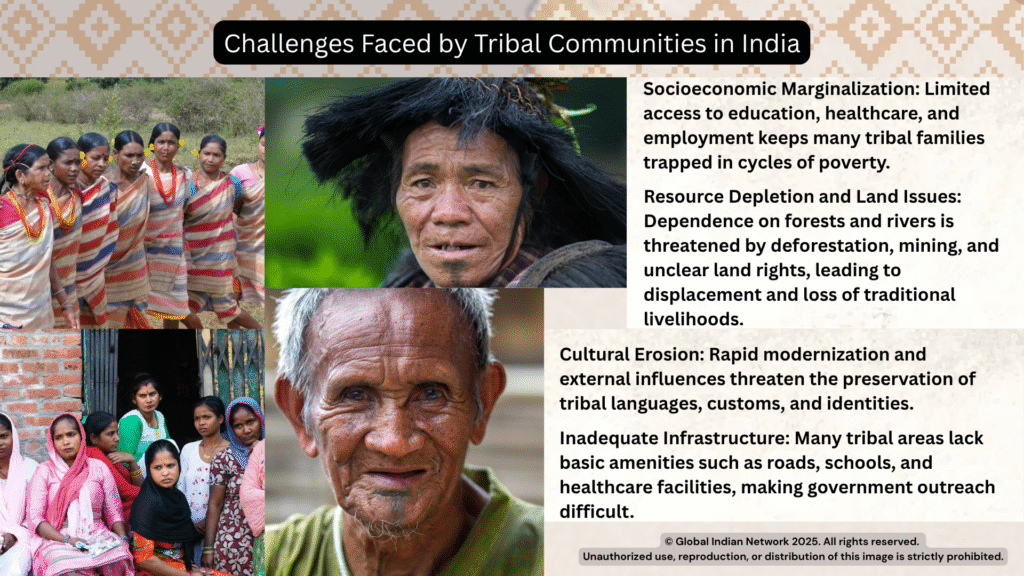
- Cultural Erosion: Rapid modernization and external influences threaten the preservation of tribal languages, customs, and identities.
- Inadequate Infrastructure: Many tribal areas lack basic amenities such as roads, schools, and healthcare facilities, making government outreach difficult.
While government programs have made notable progress, their top-down approach sometimes fails to address the specific needs and aspirations of diverse tribal groups. This is where NGOs step in, bridging gaps and tailoring solutions to local realities. The role of NGOs in tribal development has had results in India, as statistics prove.
As Dr. B.R. Ambedkar wisely emphasized, social reform is inseparable from structural transformation—
So long as you do not achieve social liberty, whatever freedom is provided by the law is of no avail to you.”

The Role of NGOs in Tribal Development
NGOs have emerged as vital change agents in tribal regions, complementing and sometimes surpassing government efforts.
How NGOs Empower Tribal Populations
The role of NGOs in tribal development includes empowering tribal communities by fostering self-reliance, developing local leadership, and engaging them in decision-making processes for culturally appropriate development. They also provide skill development, livelihood programs, and support in education and healthcare, helping tribal families achieve financial independence, preserve their heritage, and promote sustainable, community-driven growth.
Advocacy and Rights Protection
The role of NGOs in tribal development encompass advocating for the recognition and protection of tribal rights, particularly regarding land and forest resources, as well as cultural identity. They raise awareness about legal frameworks and often act as intermediaries between tribal communities and government authorities.
Example: Samatha, an NGO, successfully petitioned the Supreme Court to protect tribal land rights against illegal mining in Andhra Pradesh, thereby setting a precedent for the protection of tribal resources.
Tribal Education and Skill Development
Recognizing the importance of strengthening education, the role of NGOs in tribal development comprise design and implementation of skill development programmes tailored to tribal children, often in their mother tongue. They also offer vocational training, equipping youth and women with skills for alternative livelihoods.
Example: Sabuj Sangha in West Bengal operates education support programs for tribal children, resulting in higher retention rates and improved learning outcomes.
Tribal Healthcare and Nutrition
The role of NGOs in tribal development involve health camps, set up clinics, and run awareness campaigns on sanitation, nutrition, and disease prevention. They often collaborate with government healthcare initiatives to extend their reach into remote tribal areas.
Example: Swasti, a Karnataka-based NGO, has improved healthcare services for tribal populations by integrating traditional healing with modern medicine.
Livelihood and Economic Development and Land Rights Won
To reduce dependence on subsistence agriculture and forest produce, NGOs promote alternative income-generating activities. At the same time, forest rights are a crucial factor, as they provide ownership and some degree of self-reliance. The role of NGOs in tribal development includes providing training, facilitating access to microcredit, and helping create market linkages for tribal products.
India: Supreme Court Quashes Land Acquisition in Odisha
In the landmark case Anil Agarwal Foundation Etc v State of Orissa & Ors, the Supreme Court of India quashed the state’s grant of tribal land to a private company for a university project. The court ruled that the acquisition violated the constitutional rights of tribal people, as their objections were not heard and consent was not obtained. This judgment protected the rights and livelihoods of the local tribal community and set a precedent for future land rights cases. Thus the role of NGOs in tribal development incorporate fundamental rights.
Cultural Preservation
Many NGOs work to document and revive tribal languages, arts, and rituals, ensuring that development does not come at the cost of cultural loss.
Case Studies: Successful Interventions
- Smile Foundation: Focuses on education, healthcare, and women’s empowerment, reaching tribal communities across 25 states.
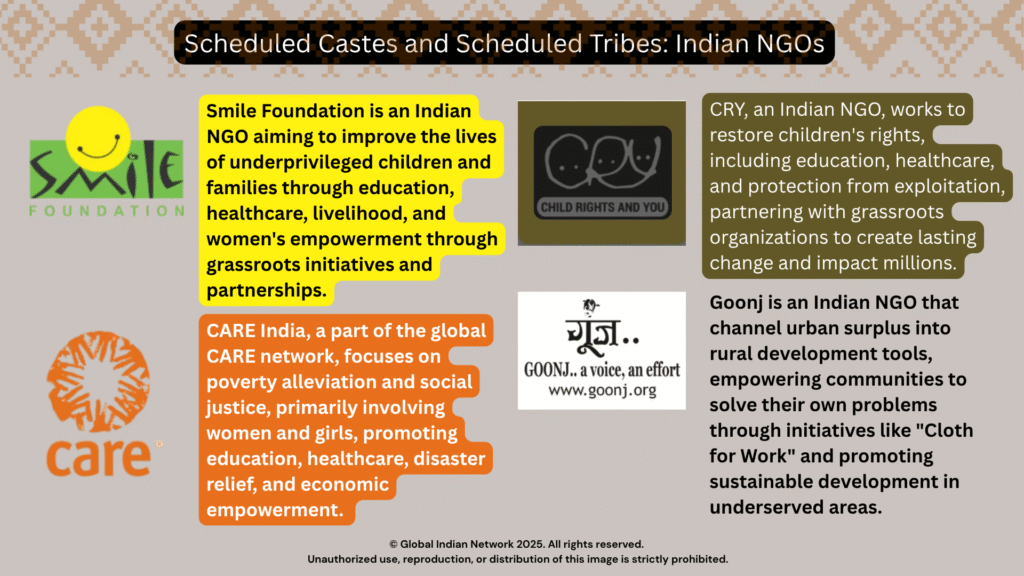
- CRY (Child Rights and You): Works on child rights, education, and nutrition, extending support to tribal children.
- CARE India: Addresses poverty, social injustice, and women’s empowerment in tribal regions.
- Goonj: Provides infrastructure development, water, and livelihood support to tribal areas; recognized for its disaster relief and community development.
Specific Challenges Faced by NGO
The outline of the specific challenges faced by Indian NGOs is shown below.
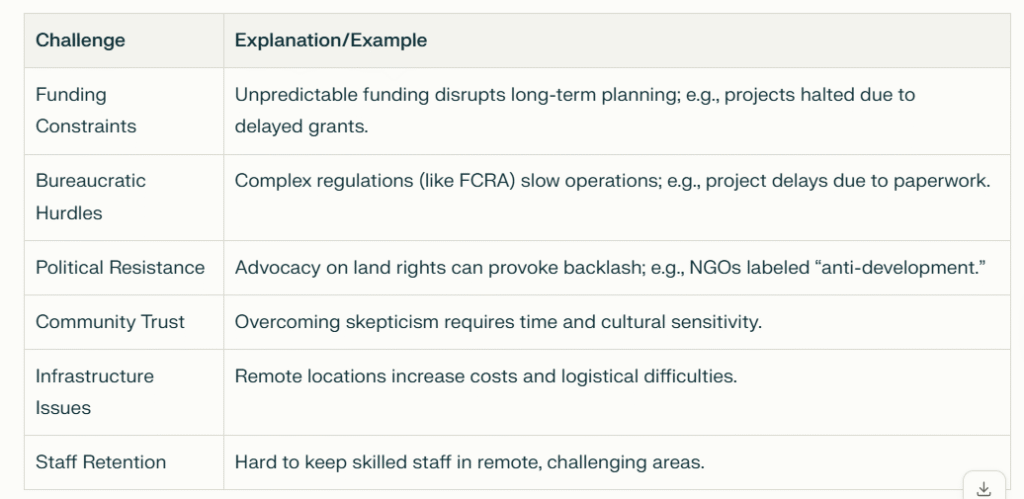
While the role of NGOs in tribal development is critical, their impact is often limited by funding instability, regulatory barriers, political challenges, logistical difficulties, and the need for sustained community engagement. Addressing these challenges requires supportive policies, streamlined regulations, and greater collaboration with government and local stakeholders.
Why NGOs Succeed Where Government Falls Short
The unique grassroots strategies employed reflect the pivotal role of NGOs in tribal development.
- Grassroots Presence: NGOs often have a deeper understanding of local cultures and needs, enabling them to design context-specific solutions.
- Flexibility and Innovation: Unlike bureaucratic government structures, NGOs can adapt quickly and pilot innovative approaches.
- Trust and Relationship Building: Years of engagement help NGOs build trust, making communities more receptive to change.
- Advocacy and Policy Influence: NGOs amplify the voices of tribal communities in policy debates, ensuring that development is inclusive and rights-based.

Government Support
India has a dedicated government body for Adivasi welfare, known as the Ministry of Tribal Affairs, established in 1999. This ministry is responsible for policy-making, planning, and coordinating programs aimed at the development of Scheduled Tribes (STs) in India, encompassing areas such as education, health, and economic empowerment. It collaborates with state governments and NGOs, and oversees key agencies such as the National Commission for Scheduled Tribes (NCST), the National Scheduled Tribes Finance and Development Corporation (NSTFDC), and the Tribal Co-operative Marketing Federation of India (TRIFED), ensuring focused attention on tribal welfare nationwide.
The role of NGOs in tribal development is crucial to expanding the basic amenities to the underserved.
Role of Tribal NGOs
The role of NGOs in tribal development has a marked presence in India and is crucial in promoting tribal welfare. These organizations focus on areas such as education, healthcare, livelihood, land ownership issues, women’s empowerment, and cultural preservation. Notable examples include the Centre for Integrated Rural and Tribal Development (CIRTD), Dilasa Sanstha, SEARCH (Society for Education, Action and Research in Community Health), Friends of Tribal Society, and Vanvasi Kalyan Ashram. The role of NGOs in tribal development often features alliances with government initiatives to reach remote areas and address pressing local needs. By bridging development gaps, these organizations play a key role in supporting the sustainable growth and empowerment of India’s tribal populations.
Tracking Change: Statistics of Tribal Welfare
Key Statistics on Tribal Development in India
• Poverty among ST communities declined from 46% in 2004-05 to approximately 24.5% in 2017-18 (NITI Aayog data)
• The proportion of tribal women participating in MGNREGA work increased from 47.5% in 2012-13 to 53.7% in 2021-22
Literacy
Literacy improvement among Scheduled Tribes (STs) in India is as follows:

Sanitation
The Swachh Bharat Abhiyan aims for universal rural sanitation, but disparities persist for SC and ST communities. Government data shows 92% of sanitation workers are from SC, ST, or OBC backgrounds, with Scheduled Castes making up 68%. Many SC/ST households lack access to improved sanitation facilities, despite government support, due to behavioral norms, lack of awareness, and financial constraints, highlighting the need for targeted and inclusive interventions.
Drinking Water Access
SC/ST households in Assam have similar access to drinking water as non-SC/ST groups, but still face significant disparities in convenience and quality. Only 1/6th of SC households have water within 100 meters, forcing most families to walk 500-1000 meters. SC/ST households spend 45-60 minutes collecting water, twice the time of non-SC groups. Additionally, 75% of SC/ST habitations have basic or substandard water access.
The lower figure (40 lpcd) is the minimum recommended for basic needs, while 55–70 lpcd is suggested for improved standards. For comparison, the urban daily water consumption limit is 135 litres, which includes water for drinking, cooking, bathing, washing, flushing, and other domestic purposes.
Economic inclusion
India's SC and ST communities face significant barriers to economic inclusion, primarily concentrated in low-wage, informal, and manual labor sectors. Despite affirmative action, many remain landless and lack formal credit, perpetuating poverty. Caste-based discrimination restricts their access to higher-paying private sector jobs, while financial exclusion exposes them to exploitative moneylenders. Despite government initiatives, income, social mobility, and quality of life gaps remain unfulfilled.

Mini Case Studies: SC/ST Economic Inclusion and Education
The role of NGOs in tribal development is best illustrated through these successful interventions.
Case Study 1: Reducing Dropout Rates among SC/ST Students in Odisha
The Odisha School Education Programme Authority (OSEPA) implemented interventions to reduce dropout rates among SC/ST students, resulting in a decrease in primary dropout rates to 3.19% and 3.13% in 2016-17. However, challenges persist at higher levels, with SCs' Gross Enrolment Ratio (GER) declining from 108.66% in primary school to 14.7% in higher education. While the role of NGOs in tribal development is distinct, the journey toward full empowerment and development is far from over.
Case Study 2: Sarva Shiksha Abhiyan (SSA) Impact in Punjab
The Sarva Shiksha Abhiyan (SSA) initiative in Punjab has significantly improved the academic performance of standard III students in language and mathematics, with mean achievement scores rising from 62% to 70% and 72% respectively. The program also led to a significant increase in the proportion of standard III children able to subtract and read simple English words. The role of NGOs in tribal development is evident from this. Yet the work is not complete.

From Red Tape to Real Change
The role of NGOs in tribal development, unlike government-led efforts, operate with grassroots agility, promoting community participation and tailoring interventions to cultural nuances. They embody participatory development and decentralized governance theories, involving tribal leaders, adapting quickly to feedback, and implementing context-sensitive strategies. This nimbleness accelerates impact and builds long-term trust, a challenge centralized agencies often struggle to achieve.
Policy Recommendations
There is a need to improve current policies to improve the lives of SC/ST communities. All recommendations aim to strengthen the role of NGOs in tribal development through better support and recognition.

Implementing these recommendations will help create an enabling environment for NGOs, ensuring more inclusive, effective, and sustainable socio-economic development for SC/ST and tribal communities in India.
A Call for Collaboration
While the role of NGOs in tribal development has demonstrated significant impact, their efforts alone cannot address the scale of challenges faced by tribal communities. Holistic and sustainable development requires robust collaboration between government agencies, NGOs, and the communities themselves. Governments must recognize NGOs as equal partners, supporting their work through funding, policy support, and capacity building.
RELATED:
- Is the Culture of the Santhal Tribe Disappearing? Here’s What You Need to Know
- 10 Must-Try Indian Tribal Foods You’ve Never Heard Of (But Will Love!)
- Empowering the Gurjar Community: Tribal Advocacy with Javaid Rahi
- Sports for Tribal Advancement: The Vision of START with Munish Makhija and Ritwik Bhattacharya
- Lost in the Mainstream: What are the Problems Faced by Tribals in India?
Conclusion
The role of NGOs in tribal development is both crucial and transformative. By empowering communities, advocating for rights, and delivering essential services, NGOs fill critical gaps left by government programs. For India’s tribal groups to thrive—economically, socially, and culturally—a collaborative, community-driven approach is essential.
Only with a clear acknowledgment of the role of NGOs in tribal development can India move toward inclusive progress.
The answer to the question “Is government enough?” is clear: Only when NGOs and government work hand in hand can tribal development be truly inclusive human development.
A quote by Bunker Roy (Founder, Barefoot College) sums it up.
The wisdom of tribal communities, nurtured for centuries, is a treasure we must respect and learn from.”
We have a question for you.
Do you think NGOs should have more say in tribal policy?

FAQs
What are the main challenges faced by tribal communities in India?
Tribal communities face several critical challenges, including poverty, lack of access to education and healthcare, land alienation, displacement due to development projects, and social marginalization. Despite legal protections and government programs, these obstacles continue to hinder their holistic development.
How do NGOs contribute to the development of tribal areas?
NGOs play a vital role in tribal development by delivering grassroots-level solutions that complement government initiatives. They help improve access to healthcare, education, sustainable livelihoods, skill training, women’s empowerment, legal rights awareness, and more, often reaching places where government schemes cannot.
What are some successful examples of NGO interventions in tribal development?
Several NGOs like SEWA (Self-Employed Women’s Association), PRADAN (Professional Assistance for Development Action), and Bharat Lok Shiksha Parishad have successfully facilitated education, skill-building, healthcare programs, forest rights advocacy, and sustainable agricultural practices across tribal regions.
How can one support tribal development initiatives?
Individuals can support tribal development by donating to credible NGOs, volunteering their skills, spreading awareness about tribal issues, supporting fair-trade tribal products, and advocating for policies that protect tribal rights and promote sustainable development.




